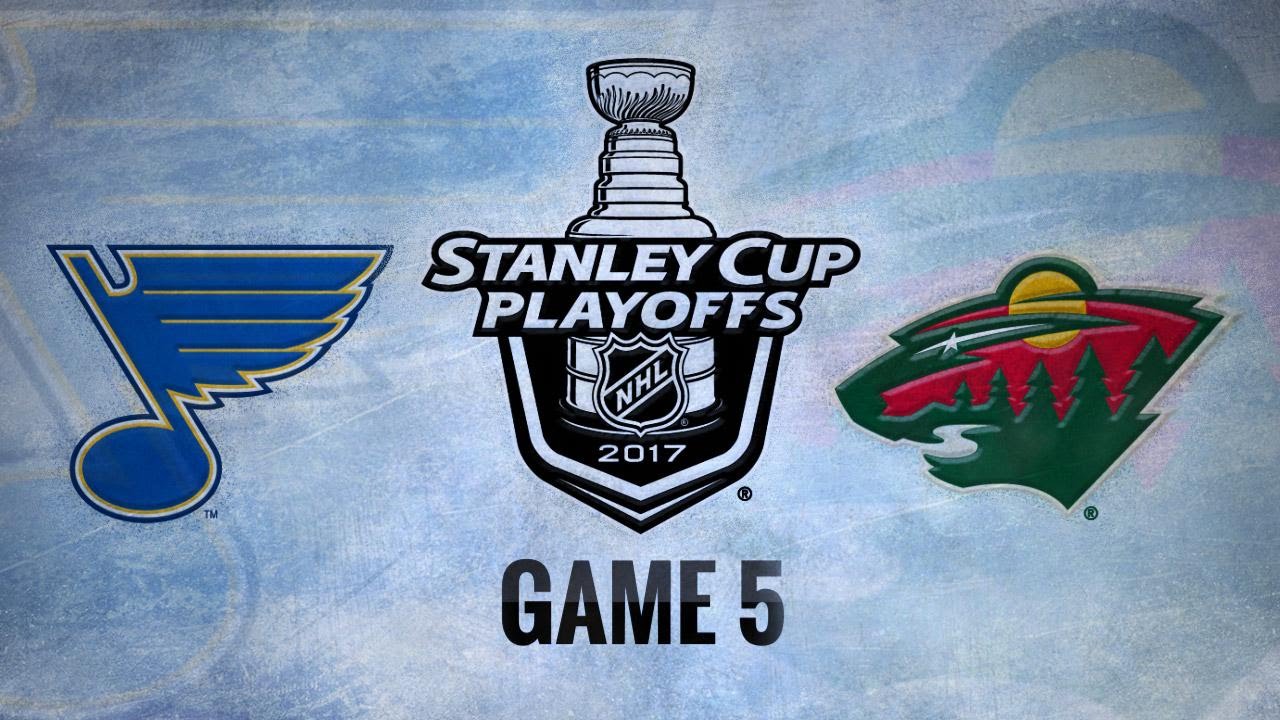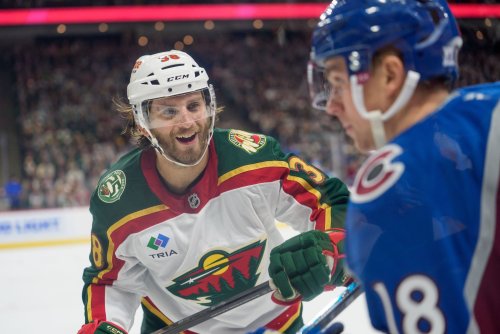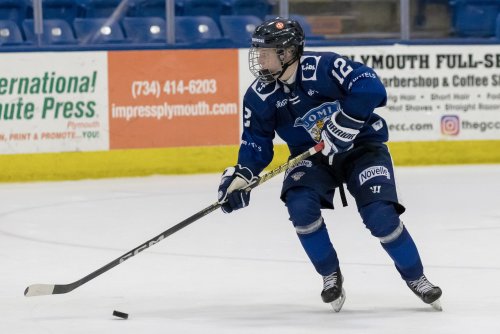
It’s time to revise a statement in the wake of the Minnesota Wild’s first-round postseason exit, losing their series to the St. Louis Blues 4-1.
A couple weeks ago, I wrote: “The prospect of a series loss to Yeo’s Blues would just be a little bitter to swallow for Minnesota faithful.” Now that it’s happened, it seems more like trying to dry-swallow a giant multi-vitamin, then spiraling into a gagging and coughing fit complete with tears in your eyes while trying to catch your breath.
Basically, saying “a little bitter” just doesn’t seem adequate to describe yet another playoff loss. This time, it comes at the hands of a coach the Wild fired a year ago.
It all ended with an overtime winner for the Blues in Game 5 Saturday afternoon in St. Paul. Of course, the Wild dug itself a 0-3 hole in the series before winning Game 4. Then there was a very frustrating slow start to another must-win game at home for the Wild in which they got behind 2-0 before a third-period rally tied the game at 3 apiece.
Getting off to a slow start isn’t exactly a new phenomenon for the Wild. Though it’s tough to understand how a team with home-ice advantage, momentum from a victory the game before and solid play throughout the series doesn’t come out on fire to start Game 5.
The Wild played some good hockey in the series, but they were not good enough to win. The better team is the one that finds a way to score goals, save the shots that need to be saved and get four Ws.
A rough go in postseasons
The Wild have made eight trips to the postseason, with five of those trips ending in the first round. The year to hang hats on is 2003, when the Wild came back from a pair of 3-1 deficits to beat Colorado and then Vancouver before getting swept out of the Western Conference Finals by Anaheim and Jean-Sebastien Giguere, who held the Wild to just one goal in the series (Game 4).
Since then, the playoff results have been pretty disappointing. They got ousted in the 2007 quarterfinals 4-1 by Anaheim. Their only division title the next year, which does not hold the prestige and dominance it might suggest, created optimism, only to have the Wild get bounced by Colorado in six games.
Then there are the past five seasons. In the lockout-shortened season of 2013, the Wild got their first taste of losing to the Chicago Blackhawks, this time in five games. They beat Colorado in the first round the next year in Game 7, but a famous stanchion bounce in Game 6 against Chicago gave Patrick Kane the series-clinching goal. Chicago ended the Wild’s season for a third year in a row in 2015 with a sweep in Round 2 after the Wild beat St. Louis in six games. Last year, the Wild lost to Dallas in Round 1.
Back to the present, where the talk of this year's demise revolved around the hot goalie in Jake Allen for the Blues. That also seemed to be part of the reason for losses in 2003, 2008 (Jose Theodore) and then with Corey Crawford of the Blackhawks. No doubt goaltenders play well and can steal games in the playoffs. This sample size makes you wonder how much of it was partially on the Wild, though, with the lack of finishing ability to put the puck in the net.
How much longer?
For the most part, with maybe the exception of the Detroit Red Wings, teams don’t make the playoffs every single year for extended stretches of time. It’s just not very sustainable with a number of factors. Talented players get older and past their prime. Then there’s the whole business side of things in regard to trades, free agency and the salary cap.
The Wild made a splash that showed they were serious about becoming contenders when they signed Ryan Suter and Zach Parise on July 4, 2012. Since then, the Wild have made the playoffs five straight seasons. Of course, annual slumps sometimes made those postseason-clinches come right down to the wire, which isn’t something anybody would like to see for a team that’s supposedly competing to win a Stanley Cup.
Parise will be 33 in July. Captain Mikko Koivu turned 34 in March. Suter will turn 33 in the middle of next season. The question has to be there: How much longer are these guys, along with the others on the team, going to be able to lead their team to the postseason? The more time that passes, the more that window starts to shrink.
This is why it’s so important to enjoy the journey of successful regular seasons when they come around. Yes, the goal is always to win a championship for any team at any level. That’s obvious. The other obvious fact is that every team but one sees its season end in disappointment or with a loss. Only one team gets to hoist the Stanley Cup in June.
It’s no secret to local fans that Minnesota teams have struggled to bring home titles. The North Stars got close in 1981 and 1991, getting to the Stanley Cup Final. The Dallas Stars won it all in 1999. The Vikings have lost four Super Bowls, all more than 40 years ago. The Minnesota Twins haven’t won a playoff series since 2002 despite a decade of division-title success. The Timberwolves had a bunch of first-round losses until losing in the conference finals, but that was back in 2004, the last time they made the postseason.
The exceptions have been the two World Series titles for the Twins in 1987 and 1991 and the three titles for the Minnesota Lynx.
It’s not all about the end goal
Anything can happen in the playoffs. The intensity ramps up, lucky bounces play a role, and it’s all about getting four wins in a best-of-seven series -- no matter how it’s achieved.
The Wild had a franchise-best season in 2016-17, and people won’t really remember that. A franchise-best 49 victories and 106 points doesn’t seem like a big deal with a first-round playoff exit. That’s understandable and a shame. Once the 82-game season is over, it doesn’t just go away. It’s not completely meaningless. There are no guarantees that a team with the most points will win the Cup, of course; that script has played out many times.
Fans that enjoy watching hockey have every right to be disappointed and frustrated with the Wild’s postseason failure. But plenty of exciting hockey happened along the way throughout 2016-17. There was that franchise-best 12-game winning streak. Guys like Mikael Granlund and Jason Zucker had career years. Eric Staal proved to be an offensive spark.
Maybe expectations are too high when it comes to the payoff in the postseason. Enjoy those moments watching a February game out at the bar with friends when there’s a last-minute tying goal. Enjoy the rivalries with divisional opponents and the skirmishes that ensue on the ice. Enjoy watching that comeback from being three goals down in the third period before winning in overtime. Enjoy the unexpected moments that only sports can provide.
Just enjoy the game.
Think you could write a story like this? Hockey Wilderness wants you to develop your voice, find an audience, and we'll pay you to do it. Just fill out this form.







Recommended Comments
There are no comments to display.
Join the conversation
You can post now and register later. If you have an account, sign in now to post with your account.
Note: Your post will require moderator approval before it will be visible.